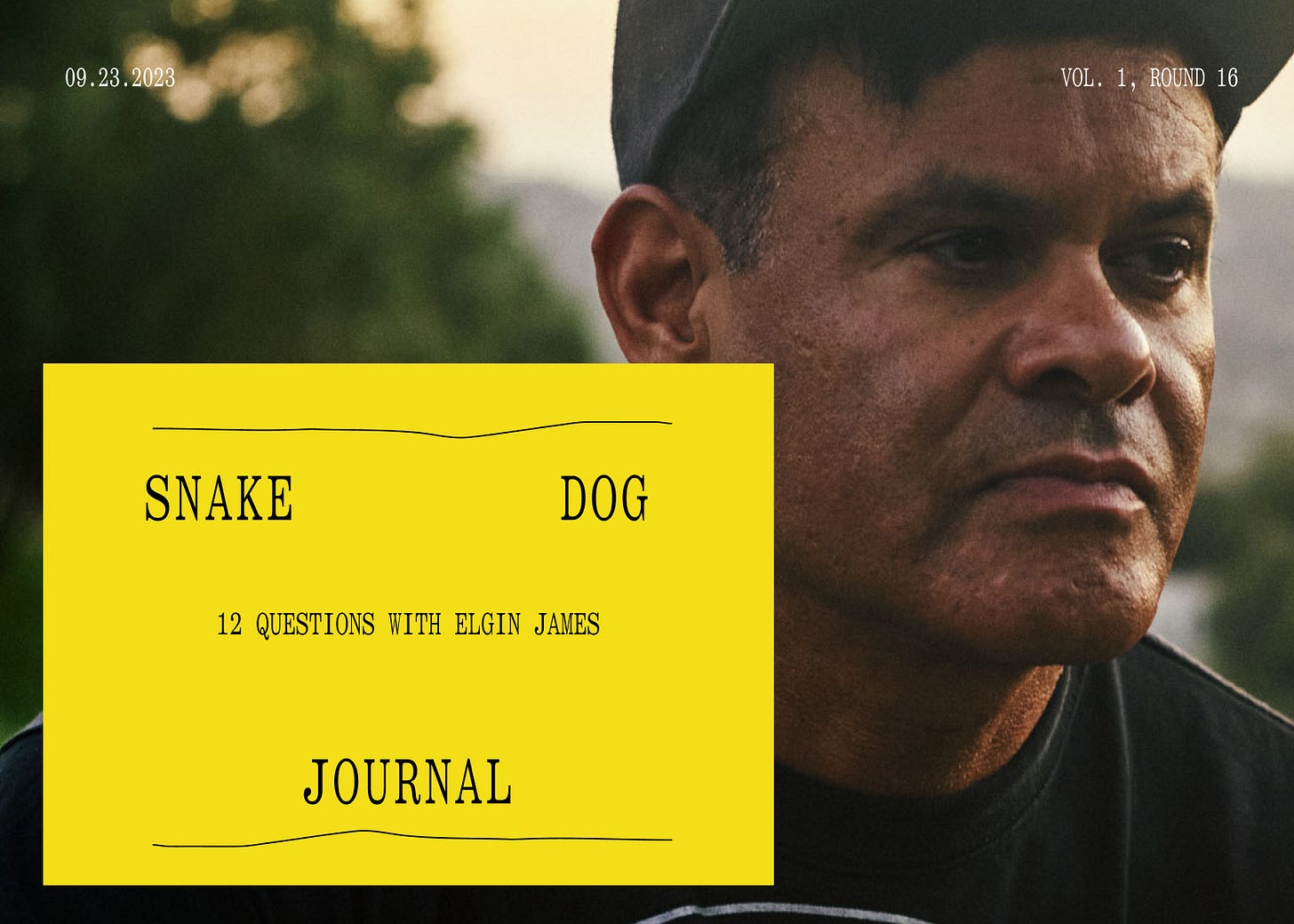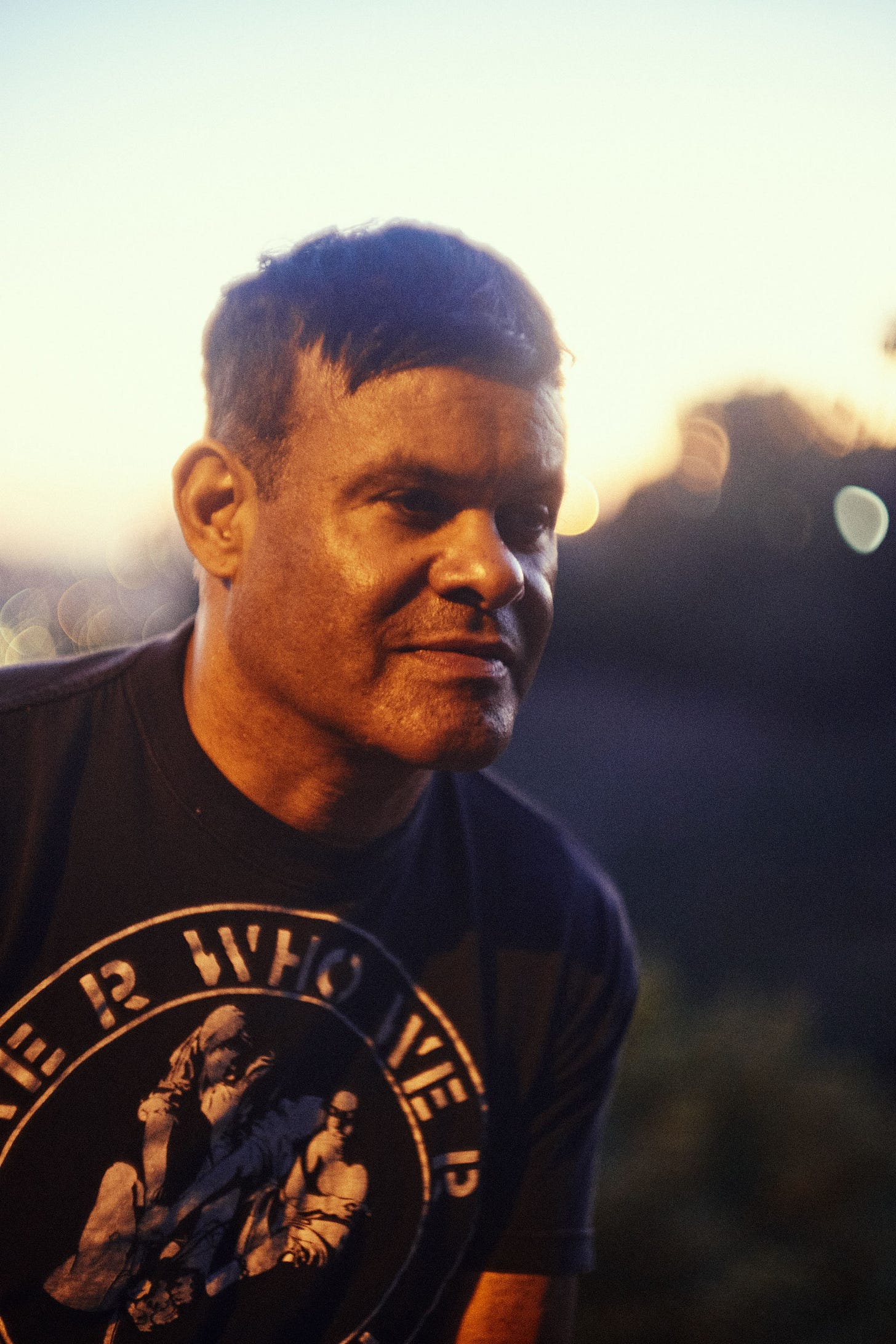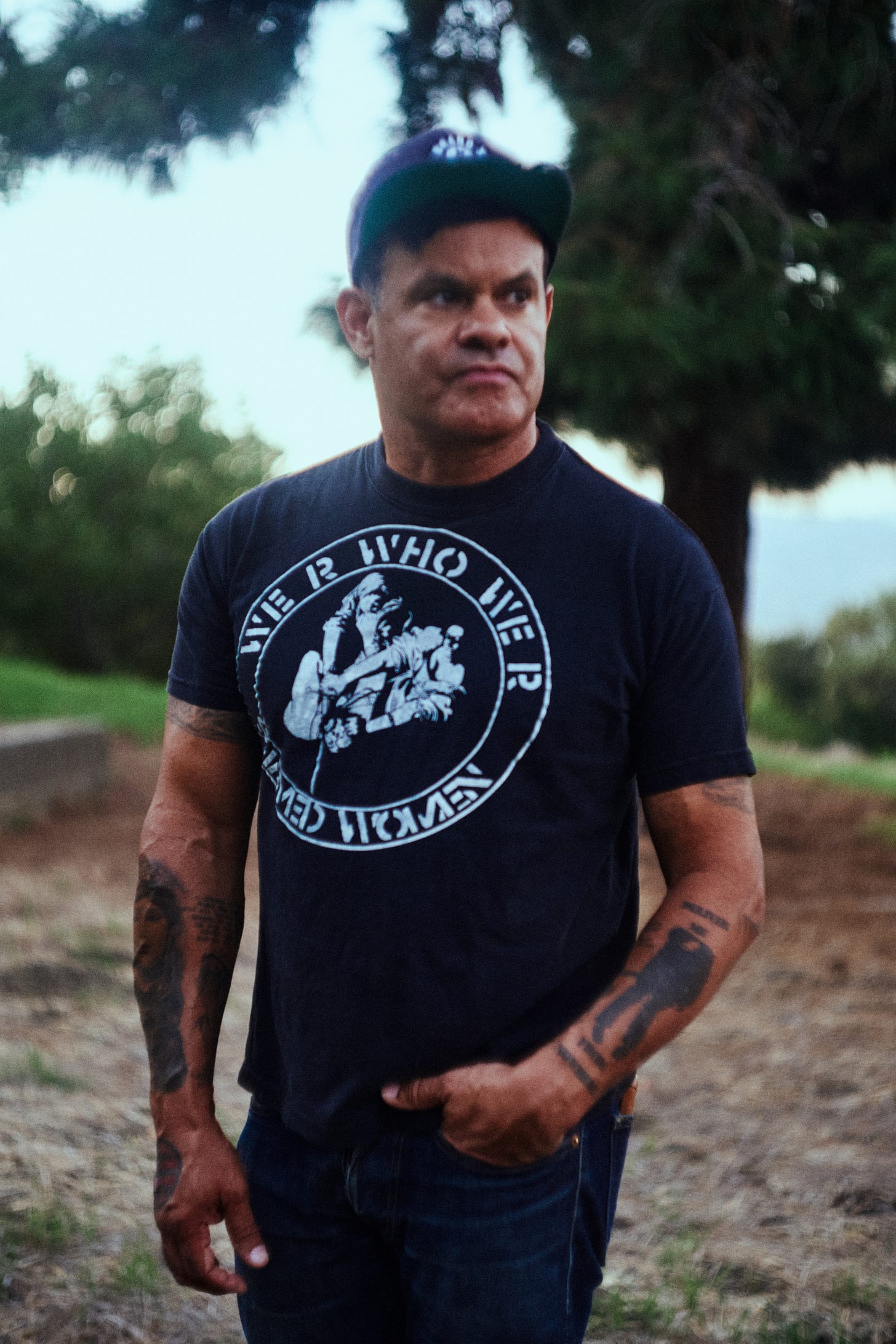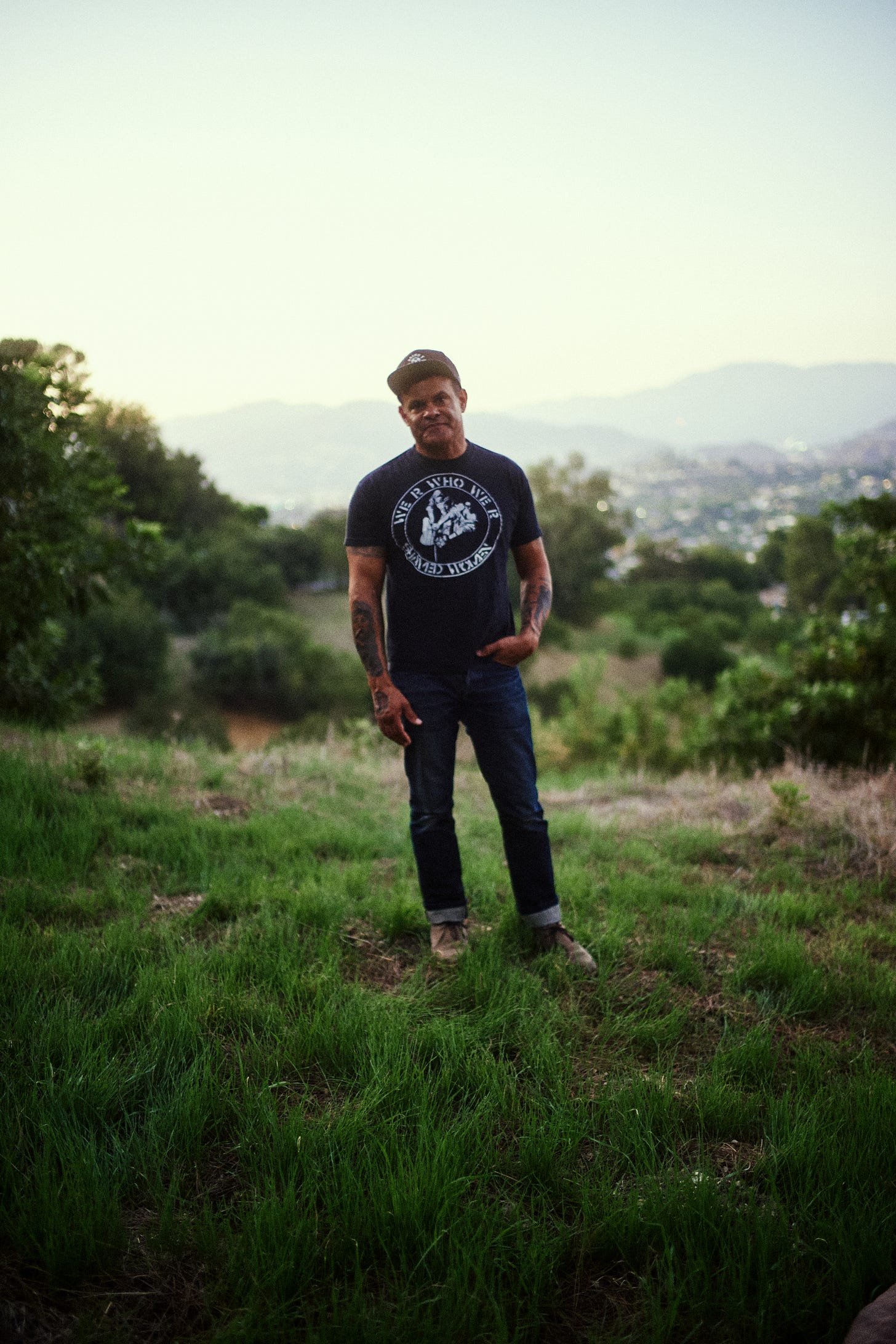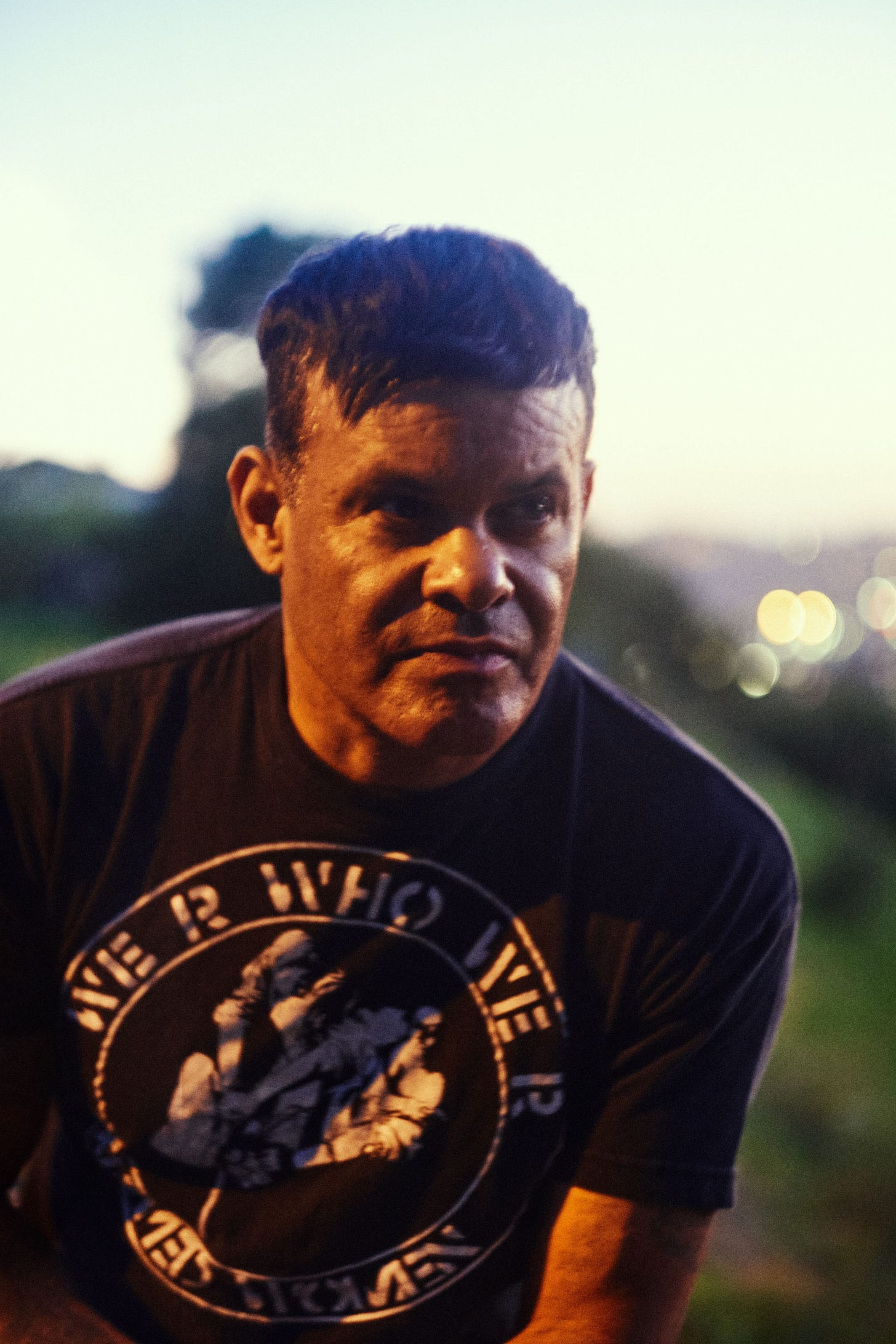BREAKING THE CYCLE
12 Questions with straight edge filmmaker, Elgin James
The filmmaker Elgin James has to be the only man on planet Earth who has both founded a multinational street gang to fight Nazis and white power skinheads and eaten a salad with Robert Redford at Sundance. Adopted. Mixed race (which James says boils down to “no race”). Addiction and violence in the home. Intergenerational trauma in his veins. Most people with backstories like James’ don’t do anything even close to either of those things. They end up dead young, incarcerated, forever disregarded, swallowed whole by their shame. Not James. As a teenager, inspired by The Autobiography of Malcolm X, he chose the straight edge path. He refused to be annihilated, refused to be silenced. Bolstered by the 80s hardcore scene and bands like MDC and Christ on Parade, James chose a life of anti-racism. And he backed it up with his fists. For the next twenty years, James’ life was marked by an intoxicating addiction to violence. And it wasn’t without consequences. “Being a person of color, getting called a ni**er and sp*c every day growing up,” James felt alone. He wanted to stop that. So he set out to work for the Southern Poverty Law Center, the organization responsible for bankrupting the Klan. But after a violent detour left him brain damaged, law school was out. With his Boston-based gang, Friends Stand United, he was still trying to do the same thing, “just with a lot less paperwork and a lot more blood.” And he disappeared into that. There was also prison, where he felt “like a drunk at a liquor store, all that violence right there and a lack of leadership that was difficult not to step into.” But luckily, he didn’t. With “literally nothing on the page that said ‘we should take a shot on this guy,’” Redford took a shot on him. But he also called him out on his sh*t. So, he took a vow of non-violence with him, leaving gang life behind forever. In its vacuum, he discovered his ultimate power in making art. I talked with the Mayans M.C. creator about being a writer who hates writing, consequences, and finding beauty with a lens shaped by violence.
In the context of your life and work, what does being straight edge mean to you?
It’s discipline. It’s accountability. With art, you’ve got to be an open nerve, you’ve got to just bleed out. You have to do it in real time all the time. You have to do it around a lot of unsafe people, too. But you’ve got to stick to that truth and not numb yourself. You’ve got to stay open, you’ve got to stay in this moment, to be present, to not escape. Today, being sober for me is just staying off social media. A bunch of motherf*ckers went off into a room to figure out how to hack our brains, how to keep us with this dopamine rush. It’s such an addiction. It’s just like drugs and alcohol. You never feel great when you get off. You just lost hours. Even if you just want to post something you made, after that you just can’t help looking back. I always say, “Don’t drink. Don’t smoke. Don’t scroll.” It was hard to get off it. I had so many false starts to get sober from that. As parents, it’s so hard not to numb ourselves with it. But I don’t want there to be one minute when my son wants to show me something or do something with me when I’m on my phone.
What was the driving force that led you to straight edge?
I had a psychiatrist at juvenile hall. It was the 80s. If you were a weird punk rock kid back then you were institutionalized. He gave me The Autobiography of Malcolm X. That changed everything. I realized that these motherf*ckers want me to annihilate myself, they want to silence my voice. I don’t know what sort of self-preservation hit me because even now, how I work, how I make art, I have zero self-preservation. I get two or three hours of sleep. I lay myself out. But something in those pages just rang like a f*cking bell to me. I wanted to set sh*t on fire and show that I was here. I felt so disregarded since birth. As anyone who has been adopted knows, you just come out having been torn from your physical mother—who you’re a part of—without knowing it and there’s just this hole that’s there. But when I read that book I was like, “F*ck that. That’s it. Never again. I’m done.”
Is straight edge a spiritual choice?
I think so. Straight edge to me is freedom. When I was in prison, everyone in my car was obsessed with getting high, getting drugs in, and what they were going to do when they got out. I was obsessed with making art. I was writing this script called Lowriders in longhand on legal paper. We found out that the COs were going to toss our cells. Everyone is running around like crazy, trying to hide their drugs, whatever weapons they have. But I was free. I wasn’t chained to that. But you can’t have so much paper. It’s a fire thing. So, I’m trying to get rid of paper. “Here, take the first act. Take this. Take these books.” When I was in prison, every motherf*cker in there was a victim. Everyone was innocent except for me. My advice is to deal with the consequences. What makes you special is what you’re most ashamed of. The thing that you’re trying to run from is your superpower. Put that sh*t out into the world. People will attack you for it. But they’ll be the first in line to buy it.
Did you use before you went straight edge?
I did a lot of drugs when I was really young. I thought that’s just what it was. I wanted to be Sid Vicious. I was cutting myself, doing all sorts of self harm, trying to just annihilate myself from this Earth. It was never really about the good time. It was pure destruction, destruction, destruction.
What drew you to the punk rock scene?
I was a really scared little kid. I came from an unsafe home. And I found a bunch of other kids who weren’t safe in their homes. We felt safer in a pit getting kicked and punched in the face than we did at home. I’m a mixed race kid. Anybody who is mixed knows that that usually dwindles down to being no race. My whole life, I’m too white for some people, too dark for others. I didn’t speak Spanish. With punk rock I found my culture.
Can you talk a little bit about the violence addiction?
With the gang, it was the three letters we wore. I was able to walk into a club, to walk into a show, to walk down the street, and have people recognize and respect me. It was so intoxicating. That became a drug. Like, “F*ck drugs and alcohol. Now I feel seen. Now I’m something.” Even if it was out of negativity and fear, it was like, “Now you know I’m here.” I got addicted to that for a couple of decades.
In the community you come from, or the communities depicted in Mayans, and other communities like them across the country, why do you think there is such a pull toward substance abuse?
Pain. For some of us, it’s in our blood. Not to use that as an excuse. At the end of the day, it is our hands bringing it to our mouths. But there’s this horror that’s around you. The things we were involved with, the violence aspect of it, you need to numb yourself from it. We all have that damage. What are we going to do with that? I did horrible things with that damage for the majority of my life. But for me, I could either be like my father and be a f*cking monster or I could be truly strong and be an artist like my mother. That’s why art is so amazing. You can deal with all the sh*t that’s inside of you. It’s the one way out.
You’re a father now. How do you apply what you’ve learned in life—past and present—to parenting?
Whatever we have in our veins is also in their veins. We think we have free will but we’re making decisions that are influenced by people we have never met. I met my biological father not so long ago for the first time. He’s been through so many of the same things I have. He’s been to prison. Same exact story. He’s part of this cycle. How do I put an end to that cycle for my son? How do I replace it with something positive? How do I put all of my fingers in that dam? As parents, we have to be hyper aware of any criticism. They carry that with them. “Oh, you’re so this.” They believe that. As a little kid I was told, “You’re a piece of sh*t. You’re worthless.” I believed that.
What’s your creative routine like?
Dread. Fear. I don’t believe that you have to be inspired. Making art is blue collar work. You have to do it everyday. Some days you have it, some days you don’t. But you’ve got to put something on the page. I have tricks and hacks because I hate writing so much. I don’t trust people who love writing. It’s awful and painful and terrible. But you do it. And at the end of the day you end up with something beautiful. Hopefully. I will work on a page for 10 minutes and then move the f*ck on. I wrote 10 pages today and they may suck but at least there’s something on that page. You’re trying to get to where you’re just finessing. Then, it’s gold. But it takes so much to get there. The hardest part is just getting sh*t on the canvas.
What’s your go-to non-alcoholic beverage?
Dude, I love Shirley Temples. It’s not performative. It’s not some cutesy thing. Sometimes I have to stay quiet and order something else but I really just want a f*cking Shirley Temple. I hate water. Water is disgusting.
How do you navigate the Hollywood scene sober?
I’m so not part of it. Going to parties? That’s not it. I’ve been doing this for 10 years and the people I’ve seen succeed are the people at home writing. People who go to SoHo House and feel like they’ve made it because they’re sitting three people away from Channing Tatum? That’s not it. Go home and write.
Who are some of your biggest influences in film and life?
John Ford. Patti Smith. Bruce Springsteen. Mark Hollis, the singer and songwriter from Talk Talk. He’s a huge influence. He said something like, “Technique isn’t important. Feeling is.” I have terrible technique. I want to have the long lens up in someone’s f*cking face. The first two seasons of Mayans was just television. It was basic cable. But later, it was Talk Talk. We were trying to make art and poetry. Lately, it’s been Thurman Munson. He was a catcher for the New York Yankees in the 70s. He was this hardscrabble dude from Canton, Ohio. But his knees gave out. There’s all this great footage of him catching and falling and getting up and falling and trying to throw the ball or barreling in and getting into fights with Carlton Fisk. He was just barely, barely hanging on. That’s how I felt doing the last season of Mayans. I have pictures of Thurman Munson—brawling at home plate and half stumbling—all over my office right now. That’s been my go-to lately. Like, “I’m going to make it through this. My knees are gone. I have nothing left. But I’m going to keep swinging the bat.”
Words by Andrew Smart / Photos by Roman Koval

